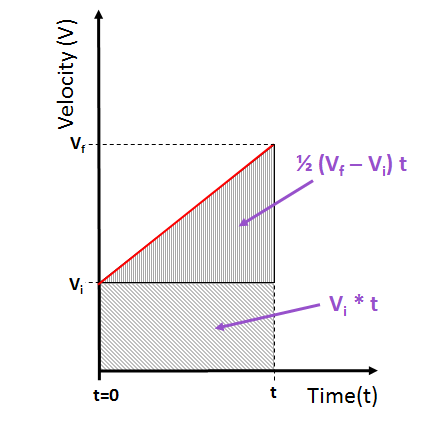Final Velocity Squared
Tags | |
UUID | fa8c6ace-6a00-11e4-a9fb-bc764e2038f2 |
The Final Velocity Squared calculator computes the final velocity a body would achieve after traveling in a straight line some distance at constant acceleration.
INSTRUCTIONS: Choose units and enter the following:
- (xi) Initial displacement
- (xf) Final displacement
- (a) Constant acceleration
- (Vi) Initial velocity
Final Velocity Squared (Vf2): The calculator returns the value in Sieverts(sv) where 1 sievert equals one meters squared per seconds squared.
The Math / Science
The formula for the final velocity squared is:
Vf2 = vi2+2?a?(xf-xi)
where:
- Vf = final velocity
- Vi = initial velocity
- a = constant acceleration
- xi = initial displacement
- xf = final displacement
DERIVATION
Since acceleration is constant, we know that the final velocity is the sum of the initial velocity and the velocity increase due to the acceleration. In other words:
[1] Vf=Vi+a⋅ t
We also know that the distance traveled, d, is the sum of the distance the object would travel at its starting velocity, Vi, plus the distance it would travel while increasing velocity from Vi to Vf:
[2] D=(Vi⋅t)+(12⋅(Vf-Vi)⋅t)
[3] D=t⋅(Vi+12⋅Vf - 12⋅Vi)
[4] D=t⋅12(Vi+Vf)
[5] ⇒t=2⋅DVi+Vf
Substituting [5} into [1]:
[6] Vf = Vi+a⋅ (2⋅DVi+Vf)
Multiplying both sides by '(V_i + V_f)`:
[7] Vi⋅Vf+V2f =V2i+Vi⋅Vf+2⋅A⋅D
Cancelling term Vi⋅Vf:
[8] V2f=V2i+2⋅a⋅D, where D=xf-x0
So, finally:
[9] V2f=V2i+2⋅a⋅(xf-x0)
EXTERNAL LINKS
Khan Academy's Average velocity for constant acceleration
Calculators
Collections
- Comments
- Attachments
- Stats
No comments |
